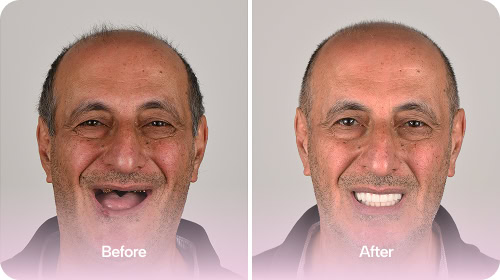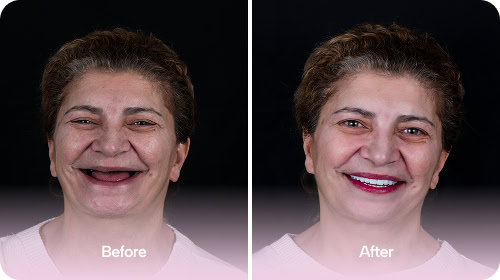
Personalised Dental Implant Consultations to Meet Your Unique Dental Needs
Start your journey to a healthier smile with our professional dental implant consultations customised to meet your individual needs and expectations.

A Dental Implant Consultation Is Your First Step to a New Smile
Living with missing teeth can make everyday tasks like eating or speaking uncomfortable while diminishing your self-esteem. Over time, unaddressed gaps may harm your oral health further. Tweed Family Dental provides professional dental implant consultations to identify suitable options for restoring function and aesthetics to your smile. Trust us to help you achieve lasting results with compassionate care.
What to Expect in the Dental Implant Consultation Process
A dental implant consultation is the foundation for achieving a restored, confident smile. Below, we outline the essential steps involved in this process so that you know what to expect:
-
The dental implant consultation process begins with a detailed discussion of your medical history, oral health, and goals to personalise your treatment.
-
A thorough oral examination, including X-rays or 3D imaging, is conducted to evaluate jaw bone density, gum health, and implant suitability.
-
Your dentist reviews findings and explains treatment options, outlining an effective plan tailored to your needs.
-
A customised treatment plan is finalised, covering procedure steps, timeline, and costs, so you’re fully informed and confident moving forward.


The Benefits of Having a Dental Implant Initial Consultation
An initial dental implant consultation is a valuable opportunity to explore your options and address concerns about treatment. Below, we highlight the key benefits of this process and how it supports a successful outcome:
-
You gain a detailed understanding of your oral health through assessments, helping determine if dental implants are the right option for you.
-
You receive a personalised treatment plan tailored to your unique dental goals, offering clarity on the procedure and expected results.
-
You learn about the timeline, costs, and aftercare involved, giving you the knowledge needed to proceed with confidence.
-
You address any questions or concerns directly with your dentist, fostering trust and peace of mind before moving forward.
Personalised, High-Quality Dental Implant Services for Every Patient
Our clinic is dedicated to providing high-quality dental implants with a focus on patient satisfaction and long-lasting results.
All-On-4 Implants
All-on-4 implants restore a full arch of teeth using just four implants for lasting stability.
Learn MoreImplant-Retained Dentures
Implant-retained dentures offer secure, natural-looking options with improved comfort, stability, and functionality over traditional dentures.
Learn MoreFlexible and Affordable Payment Options for Stress-Free Dental Care
We offer a flexible, budget-friendly payment structure to make quality dental care accessible. Our dental clinic partners with major health funds to support your needs.
Child Dental Benefits Schedule
Eligible children can receive up to $1,052 over two years for essential dental treatments, which promote healthy smiles and oral health.
Dental Services for DVA Card Holders
DVA cardholders can access comprehensive dental services that provide high-quality care, ongoing support, and better outcomes for their oral health needs.
Bupa Members First Preferred Provider
As a preferred provider, eligible Bupa members enjoy enhanced benefits, reduced treatment expenses, and access to reliable dental care for eligible members.
Nib First Choice Preferred Provider
Nib First Choice members gain access to exceptional dental care, reduced treatment costs, and exclusive benefits for a seamless and stress-free experience.
CBHS Choice Network Preferred Provider
The CBHS Choice Network offers members access to high-quality dental services, lower treatment costs, and additional benefits designed for member convenience.
MediPay
MediPay offers quick, flexible loans, allowing patients to conveniently manage their dental costs and access quality dental care whenever needed.
Zip
Zip allows patients to break dental costs into manageable instalments, making essential treatments accessible, affordable, and budget-friendly without financial stress.
Afterpay
Afterpay allows patients to split dental treatment costs into four interest-free payments, providing flexibility, convenience, and accessible options for essential care.
smile.com.au
Save on dental treatment in Tweed Heads with smile.com.au membership—no waiting periods, no caps, and no exclusions, just hassle-free savings on dental care.
Explore Our Smile Gallery of Dental Implant Treatment Success
View amazing results in our smile gallery, highlighting before-and-after photos of patients who regained their smiles and confidence through dental implants.
Frequently Asked Questions
Here is everything you need to know about dental implant consultations, providing details about the entire process and preparation involved.
How long is a dental implant consultation?
The dental implant consultation process is the first step in determining if dental implants are a suitable option for the patient. It can take 30 minutes to two hours, depending on factors like:
- Case Complexity:
Patients with more complex oral health conditions or those requiring multiple implants may need longer consultations to assess their needs fully.
- Additional Imaging or Tests:
If advanced imaging, such as X-rays or 3D scans, is required, this can extend the appointment time.
- Preparatory Procedures:
Discussions about potential preparatory treatments, such as bone grafting or tooth extractions, may add time to thoroughly address all necessary details.
- Medical History Review:
A detailed review of your medical history is conducted to identify any conditions or medications that may impact treatment.
- Treatment Options Discussion:
Exploring alternative treatments or implant options tailored to your unique needs can take additional time during the consultation.
- Financial Considerations:
Time may also be spent discussing costs, health fund cover, and payment plans to help you make practical arrangements.
- Patient Questions and Concerns:
Addressing your questions and concerns in detail helps you feel confident and informed about the process moving forward.
What happens at an implant initial consultation?
A dental implant initial consultation helps assess whether dental implants are the right option for replacing missing teeth. Here’s what usually happens:
- Medical and Dental History Review:
Your dentist will assess your medical history, including medications and any conditions that could affect the tooth implant procedure or healing.
- Thorough Oral Examination:
A detailed assessment of your teeth, gums, and jawbone is conducted to check for issues like gum disease or bone loss.
- Imaging:
X-rays or 3D scans are taken to evaluate sufficient bone density and plan dental implant placement.
- Discussion of Treatment Goals:
You’ll discuss your expectations, concerns, and desired dental implantation outcomes with your dentist.
- Exploration of Treatment Options:
The dentist will present treatment plans, including preparatory procedures like bone grafting or tooth extractions if needed.
- Answering Patient Questions:
Your dentist will provide answers to dental implant FAQs so that you feel confident about the process.
Schedule a dental implant initial consultation with us today so we can assess your dental health and create a personalised treatment plan.
What questions do they ask when you get the implant?
When getting a dental implant, the dentist will ask a series of questions to assess your suitability and plan the minor surgery effectively. Common questions asked during dental implant consultations include:
Do you have any health conditions (e.g., diabetes) or take medications that could affect healing?
Have you experienced gum disease, tooth loss causes, or jaw bone issues?
Do you smoke or have habits that might impact implant success?
What are your expectations for aesthetics and functionality?
Have you had prior dental surgeries or treatments?
Are you allergic to any materials used in dental procedures?
What is your current oral hygiene routine, and how do you maintain it?
Do you have any concerns about the recovery process or aftercare requirements?
Are there specific timelines or events that might affect scheduling your treatment?
Have you experienced any chronic pain or discomfort in your jaw or teeth recently?
It’s important to answer all questions truthfully. That way, your dentist can create a safe and effective treatment plan tailored to your needs.
How is my jawbone health assessed for dental implant surgery suitability?
Assessing jawbone health is a critical step in determining your suitability for a dental implant. This evaluation checks if the jawbone is strong and dense enough to support the implant securely. It usually involves the following:
- X-Rays and CBCT Scans:
Advanced imaging techniques, such as cone beam computed tomography (CBCT), provide detailed 3D views of bone density, volume, and structure.
- Clinical Examination:
Dentists may palpate and visually inspect the lower and upper jaws to identify any irregularities or deficiencies.
- Bone Quality and Quantity Analysis:
The dentist evaluates the thickness, height, and density of the jawbone to verify it can withstand implant forces.
- Assessment of Anatomical Structures:
Imaging helps identify critical structures like nerves or sinus cavities to avoid complications during surgery.
A thorough jawbone assessment is essential. It establishes a strong foundation for the entire dental implant process, resulting in a durable and functional implant.
How long do you go without teeth when getting implants?
The time spent without teeth during the dental implant process usually ranges from six weeks to six months. This is necessary for osseointegration, where the implant fuses with the jawbone to create a stable foundation for the final restoration. Factors like healing time, bone health, and whether additional treatment processes like bone grafting are required can influence this timeline.
To minimise the time spent without teeth, patients may be provided with a temporary dental prosthesis. Temporary dentures, dental bridges, or dental crowns are often placed immediately after surgery or shortly thereafter to maintain appearance and functionality. In some cases, immediate implants (or “teeth-in-a-day”) allow for the placement of temporary teeth on surgery day, eliminating any toothless period.
How much do dental implants cost?
Dental implants offer an effective replacement teeth option, but they can be a significant financial investment. A straightforward dental implant usually starts at $5,200 per tooth, while All-on-4 dental implants range from $24,300 to $45,200. The total cost depends on various factors, such as:
- Number of Implants:
More implants mean higher costs, as each implant requires individual placement and materials.
- Preliminary Procedures:
Bone grafting procedures, tooth extractions, or sinus lifts may be necessary, adding to the total expense.
- Materials Used:
Titanium implants are generally more affordable than zirconia, which is often chosen for its aesthetic advantages.
- Dentist’s Experience:
Experienced dental professionals may charge more for their advanced skills in the surgical placement of the implant and minimising risks.
- Location:
Dental services in urban areas tend to cost more than those in rural regions due to higher overhead expenses.
- Laboratory Fees:
Customised crowns or bridges made in a dental laboratory can also impact the overall cost of treatment.
During the dental implant consultation process, you can receive a detailed cost estimate tailored to your needs. This helps you understand the financial aspects of your treatment and proceed with clarity and confidence.
Do health funds cover dental implants?
Health funds may partially or fully cover dental implant treatment, depending on your provider and policy. To find out if yours does, follow these steps:
- Review Your Policy:
Carefully check your health fund policy for major dental cover, annual limits, and any exclusions related to dental implants.
- Contact Your Provider:
Speak with a representative to confirm implant cover, reimbursement rates, waiting periods, and any pre-approval requirements.
- Consult Your Dental Team:
During your dental implant initial consultation, find out if the clinic can provide information on what your health fund may cover.
Do users of implants require follow-up visits?
Yes, follow-up visits are essential for dental implant users for the following reasons:
- Monitoring Healing:
Dentists assess osseointegration (bone fusion) and soft tissue recovery, especially during the first year.
- Preventing Complications:
Regular check-ups help detect early signs of infection, gum disease, or implant failure.
- Dental Hygiene Maintenance:
Dentists provide professional cleanings and guidance on caring for implants.
- Adjustments:
Bite alignment or occlusion may need fine-tuning to prevent stress on the implants.
- Longevity:
Routine care helps implants remain functional and durable over time.
How often should dental implants be checked?
Dental implants should be checked regularly to support their health and functionality. The frequency of visits depends on the stage of recovery and individual needs. Here’s an overview:
- First Year After Surgery:
Check-ups every three to six months are necessary. They help monitor healing and confirm that the artificial tooth root is integrating properly with the jawbone.
- After the First Year:
Routine visits every 6–12 months help maintain implant health. They also provide an opportunity to assess the condition of your gum tissue and remaining teeth and address any long-term concerns.
How do you know if a dental implant procedure is successful?
Dentists evaluate several key factors to know if the dental implant surgical procedure is successful. These include:
- Implant Stability:
The implant must remain immobile when tested clinically, indicating proper osseointegration.
- Absence of Pain or Infection:
There should be no persistent discomfort, swelling, or signs of infection around the implant site.
- Healthy Bone Integration:
X-rays should show that the bone around the implant is stable. These should be little to no gaps or bone loss, ideally less than 0.2 millimetres per year after the first year.
- Functional Performance:
The implant should allow for comfortable chewing and biting without any complications like natural teeth.
- Aesthetic Outcome:
The implant should blend well with surrounding teeth to provide a natural and visually pleasing appearance.
How should I care for my dental implants after the dental implant procedure?
Proper aftercare is essential for achieving dental implant success. Here are some important tips:
- Maintain Good Oral Hygiene:
Brush twice daily with a soft toothbrush, floss with implant-specific floss, and rinse as recommended by your dental professional.
- Attend Regular Dental Check-Ups:
Visit your dentist every three to six months for professional cleanings and to monitor your implants.
- Follow Post-Surgery Instructions:
Stick to soft foods like soups and smoothies and avoid smoking. Additionally, manage pain and swelling with pain relief medication and ice packs.
- Commit to Long-Term Dental Implant Maintenance:
Proper care helps your implants remain a reliable tooth replacement option for years to come.
How do you know when your implants need replacing?
Knowing when your dental implants need replacing is key to maintaining oral health. Common indicators include:
- Pain or Discomfort:
Persistent pain around the surgical site may indicate infection or inflammation affecting the gum tissue, adjacent teeth, or surrounding bone.
- Loose Implants:
Movement of the implant suggests a lack of integration with the bone, compromising the stability of the artificial tooth.
- Gum Recession:
Receding gums can expose the implant or its components, impacting aesthetics and functionality.
- Lack of Bone Growth:
X-rays showing significant bone loss around a dental implant may require further evaluation or intervention.
- Healing Process Issues:
If integration problems occur early in the implant treatment, replacement may be necessary after appropriate healing.
Join Our Family of Happy Patients; Schedule Your Visit Today!
Experience exceptional care with our trusted dentist in Tweed Heads. Book your appointment today and take the first step towards maintaining a healthier, brighter smile for you and your family.



